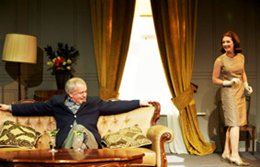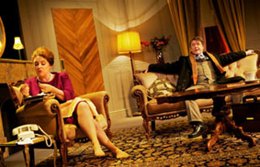In Neil Simon’s Plaza Suite, three separate stories are linked by a shared space: suite 719 of New York’s Plaza Hotel in 1968. In the first, a workaholic man in a mid-life crisis is frustrated by his wife’s acceptance of his symptoms, from an obsession with weight loss to a potential affair, particularly as he cannot accept it himself. In the second, a successful Hollywood producer tries to reclaim a lost authenticity by meeting his high school sweetheart, now a New Jersey housewife obsessed by celebrity. In the third, an hysterical mother and father of the bride try to cajole their jittery daughter out of the bathroom on her wedding day, but fail to communicate with her across the distance of generational perspective.
Though the three acts are narratively unconnected, the intersections between them run much deeper than the geography. The playwright’s gaze is directed at ideas and images of the self by means of seemingly comically cross-matched but, of course, symbiotic couples. In Sam Nash (Mark Lambert) we have a man longing for his energetic youth and in Karen (Karen Ardiff) a wife, not a mother, who wants partnership, respect, and love as  they grow older together and face a new kind of future. In Jesse Kiplinger (Darragh Kelly) we find the archetypal Hollywood mogul longing for an authentic experience, but finding image-obsessed Muriel (Ali White), who is happier with fantasy. In Norma (Eleanor Methven) and Roy Hubley (Nick Dunning) again we have archetypes in the father listing the staggering cost of the wedding that could crumble around him and the mother in constant and immediate fear of disaster but somehow enduring with more strength than she would admit.
they grow older together and face a new kind of future. In Jesse Kiplinger (Darragh Kelly) we find the archetypal Hollywood mogul longing for an authentic experience, but finding image-obsessed Muriel (Ali White), who is happier with fantasy. In Norma (Eleanor Methven) and Roy Hubley (Nick Dunning) again we have archetypes in the father listing the staggering cost of the wedding that could crumble around him and the mother in constant and immediate fear of disaster but somehow enduring with more strength than she would admit.
Though these are first and foremost Jewish types and written with a keen and specific eye for the humour and rhythm of Jewish-American ethnicity as it stood in 1968, there’s nothing to say you can’t deal with these characters outside of their historical milieu. The prospect of a Rough Magic production perhaps taking an askance perspective on social mobility and generational shift outside of Simon’s very specific frame is tantalizing, and there was perhaps some promise in the decision to present the production as the work of three directors, each veterans of the company’s SEEDS Programme for young practitioners.
There are things you can do with Plaza Suite, as evinced even by its own first iteration, where the central roles in all three segments were filled by the same two actors. Over time the male and/or female roles have been fixed to one performer supported by varying co-stars of the opposite gender. It’s flexible enough, and there’s some depth there to work with. But Rough Magic’s 2011 presentation at the Pavilion Theatre isn’t really reaching very far beyond the obvious. No sidelong glimpse at modern Ireland here, no ‘update’, no reframe, no experimentation. Its aim is very simple: present a clean, clear, and faithful production of a classic, funny show and let people come out to enjoy themselves on a summer’s evening in Dun Laoghaire. There’s nothing wrong with that aim, and God knows, we could all use a laugh.
Thankfully, laughs are to be found throughout the production, though probably most uncontrollably during the second segment in which Ali White’s marvellously delirious rendering of the star-struck and slightly drunk Muriel is a hilarious study of delusional behaviour. Darragh Kelly seems to be channelling Jack Lemmon, but that’s not such a bad thing. Director Aoife Spillane-Hinks builds a nice degree of physical tension between her two performers, reducing the large space by limited staging and focused lighting to bring matters to a head between the former lovers in a more intimate setting.
The laughs are easiest and most obvious in the final segment, where director Matt Torney goes for flat-out slapstick, aided and abetted by a game Nick Dunning, who hurls himself against the set, wields a chair over his head, and staggers through an open doorway like a wet and angry cartoon character with admirable physicality. In the same segment Eleanor Methven does a lovely line in barely repressed hysteria that plays nicely against the wild swings of the physical slapstick elsewhere in the piece.
 The opening segment is less obviously funny, but director Sophie Motley does draw a surprisingly lively and varied series of registers from Karen Ardiff’s Karen Nash, who swings from girlish excitement to romantic disappointment to palpable hope and fear portrayed in voice and posture with notable cohesion. Mark Lambert is perhaps a little overly shrill and moves his head an awful lot as Sam Nash, but his poignant speech about lost youth is still affecting. As probably the most dramatic segment, the slightly off-the-mark accents hurt a little more here than elsewhere, but the direction is lively enough to compensate.
The opening segment is less obviously funny, but director Sophie Motley does draw a surprisingly lively and varied series of registers from Karen Ardiff’s Karen Nash, who swings from girlish excitement to romantic disappointment to palpable hope and fear portrayed in voice and posture with notable cohesion. Mark Lambert is perhaps a little overly shrill and moves his head an awful lot as Sam Nash, but his poignant speech about lost youth is still affecting. As probably the most dramatic segment, the slightly off-the-mark accents hurt a little more here than elsewhere, but the direction is lively enough to compensate.
The entire production takes place against a lushly-designed set, bathed in muted gold and bronze tones for much of the time, though springing into a chillier, more gaudy blue for the final act, indicating an earlier time of day, but also a different tone: slapstick is about foreground, and here Sarah Jane Shiels’ bright lighting appropriately drives us away from the decor and onto the actors.
Bláthín Sheerin's set doesn’t overly dominate the direction, but it does constrain the choices to a large degree. Motley uses it most fluidly, keeping her actors in fairly constant motion and yet never losing focus. Hinks, as noted, closes it down somewhat (and to her advantage), while Torney exceeds its limits by having Dunning climb about ‘outside’. It serves to create the setting for what the production seeks to deliver, though – which is professionally mounted commercial entertainment.
Dr Harvey O'Brien teaches Film Studies at University College Dublin.